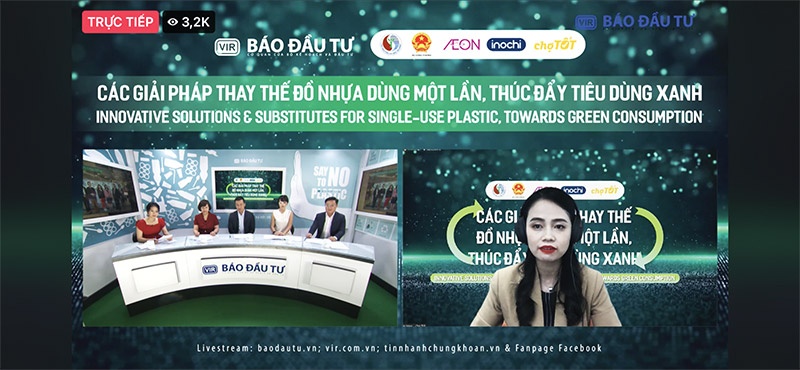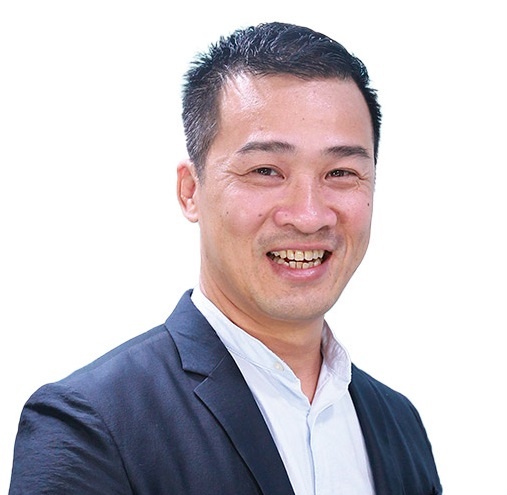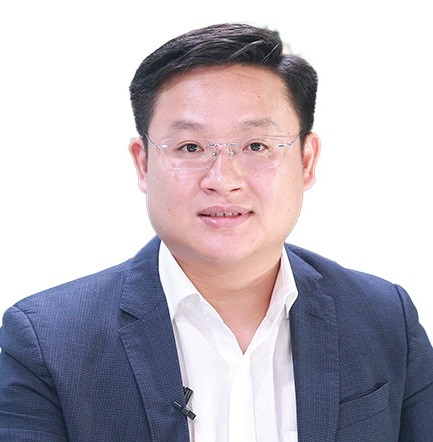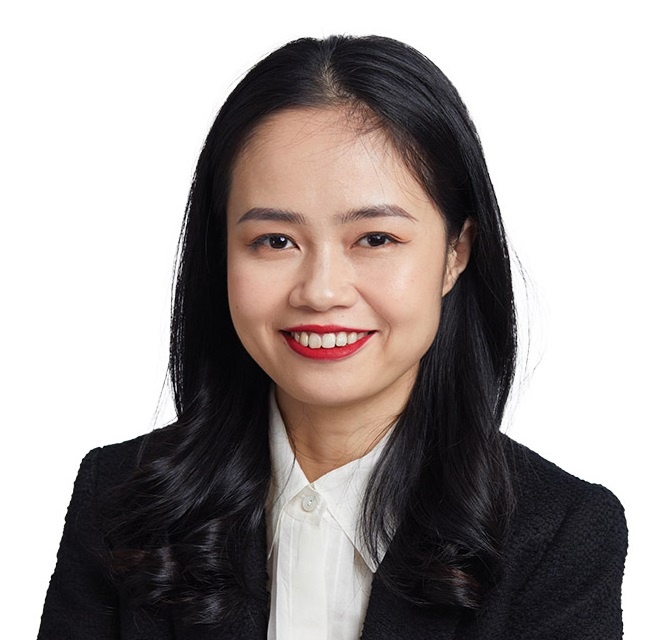Plastic use drop hinges on consumers
 |
| There are many answers being discussed when it comes to use of single-use plastics, Photo: Chi Cuong |
After 40 years, Tan Phu Plastic JSC decided to change its name to Tan Phu Vietnam JSC. The removal of the word “plastic” from the business name is a bold decision as Tan Phu is known as one of the leading plastic manufacturing companies in Vietnam.
However, the decision represents the redefinition of the firm’s development strategy towards sustainability and more environmentally-friendly products.
At last week’s talk show Innovative Solutions and Substitutes for Single-use Plastic towards Green Consumption held by VIR last week, Tan Phu chairman Hoang Anh Tuan said, “In the past, we consumed about 20,000 tonnes of plastic per year in the production process. Now, it only takes about 12,000 tonnes to produce the same amount of products.”
The increase in consumer awareness about single-use plastics in recent years has prompted manufacturers, retailers, and service providers to come up with suitable alternatives to plastic packaging and bags.
Elsewhere, Starbucks Vietnam started to eliminate plastic straws and switched to paper straws about four years ago. When receiving complaints from customers that paper straws do not last long and dilute easily, the brand launched an initiative to change the plastic lids from PP plastics to PET, with the advantage of having a pouring method that allows consumers to drink easily without the need for a straw.
Patricia Marques, general manager of Starbucks Vietnam said, “We will start programmes for cup sharing, where nobody needs to own a cup but can pick up a drink in a reusable cup and drop the cup in any other store and retrieve the previously paid deposit. These cups will then go for sanitisation and can be reused. Programmes like this are happening in many other countries already.”
Data by Kantar from 2020, cited at the talk show, shows that manufacturers and retailers play an important role in steering consumption trends and contributing to a significant reduction of environmental pollution if there is a sustainable development strategy. Meanwhile, the study found that other factors depend on a government’s incentives and sanctions.
Many businesses also come up with unique initiatives to gradually cut single-use plastic packaging and bags out of their business, while providing customers with more eco-friendly alternatives.
According to BAEMIN Vietnam CEO Jinwoo Song, many businesses are now interested in internal education and conducting a series of training sessions for employees to raise their awareness about single-use plastic products and promote a greener lifestyle.
One of the highlights of BAEMIN’s actions includes in-app options like “No disposable cutlery, please” and “No side dish, please” for users that aim to reduce food and plastic waste whilst saving costs for merchants.
Meanwhile, other businesses pioneered special business models by calling for recycling, prolonging the lifecycle of products, and limiting emissions to the environment and consumption of resources for new production.
A survey by e-commerce service Cho Tot related to consumption habits showed that, for every 100 respondents, 83 people would buy and sell used items and, if given the opportunity, would continue to use them.
Hoang Thi Minh Ngoc, chief growth officer of Cho Tot said, “We see a trend of sustainable consumption and using recycled products among young people. They are the generation to lead a green consumer lifestyle in each family as well as in the community.”
According to a survey conducted by the Institute of Strategy and Policy on Natural Resources and Environment in 2021, up to 104,000 single-use plastic bags are used in Vietnam’s supermarkets each day, equivalent to 38 million bags a year.
Vu Minh Ly, deputy director of the Communication Centre for Environmental Resources at the Ministry of Natural Resources and Environment (MoNRE) said, “The revised Law on Environmental Protection 2020 considers waste a form of resource. This is a new and groundbreaking approach to waste management. Numerous policies and incentives are in place to encourage businesses to minimise single-use plastic, aiming to achieve the prime minister’s goal of eliminating all single-use plastics from Vietnam by 2025.”
| Vu Minh Ly-Deputy director, Communication Centre for Environmental Resources
The MoNRE has set forth the target of terminating the use of single-use plastic items and non-degradable nylon bags in Vietnam by 2025. In fact, non-degradable nylon bags currently distributed freely and massively in the market are due to their low cost and amid less effective tax vehicle. If nylon bags are more expensive, the consumers would think twice upon using them. The movement fighting against plastics waste has been taking place robustly in diverse aspects of social life in the past three years. For instance, in many meetings at governmental bodies from central to local levels currently, single use plastic bottles of water are no longer used, yet replaced by small glass containers or the like. Quek Siu Rui-General director Carousell Group
While the normal shopping cycle is to buy new things and throw away old ones, Carousell and Cho Tot (which we own) promote the market for buying and selling used goods, helping to prolong the life of products, promoting a circular economy model. Selling and giving away secondhand articles is already a way of contributing to the circular economy. And our group has been doing this for over 10 years. In the next 10 years, we want to create a lot more seamless, convenient, and trusted services. For example, we just launched a project on escrow payments, which is our first step to making buying and selling a lot more secure on Cho Tot. We are also going to roll out more features to make everything more convenient, such as the authentication of luxury goods. Hoang Anh Tuan-Chairman of the Board Tan Phu Vietnam JSC
The traditional behaviour of Vietnamese was to hoard nylon wrapping and reuse plastic items. We have designed and modified smart and eco-friendly plastic items to guide people in the habit of sustainable consumption. Both domestic and international consumers are receptive to our sustainable product lines. Despite various challenges confronting businesses, our revenue in 2021 tripled in comparison to the previous year. Apart from environmental benefits, sustainable plastic products should be considered a potential business model. We are pursuing three primary strategies: diversifying our product portfolio; producing high-quality items to prolong lifespan; and making thinner single-use plastic items to minimise the amount of plastic waste. Hoang Thi Minh Ngoc-Chief growth officer Cho Tot
More than 70 per cent of transactions on Cho Tot take place directly between vendors and consumers. In recent years, millions of discarded goods have been repurposed on Cho Tot, reducing emissions equivalent to 21 days of travel in Hanoi. In the near future, we plan to implement programmes to promote sustainable consumption in the near future. For instance, we will engage with partners that have the same goal of promoting sustainable consumption and design an exhibition and giveaway event on plastics recycling. In particular, we encourage the give away of old plastic household items so as to foster a plastics-based circular economy. We also make videos and send messages encouraging ocustomers to recycle and give away unused items. |
What the stars mean:
★ Poor ★ ★ Promising ★★★ Good ★★★★ Very good ★★★★★ Exceptional
Related Contents
Latest News
More News
- Keppel Land raise plastic waste awareness (July 09, 2022 | 13:45)
- 3Vs for gender-inclusive circular era (July 01, 2022 | 14:33)
- Alliances formed in mission to alter behaviours (July 01, 2022 | 14:19)
- Mainstreaming circular plastic plans (July 01, 2022 | 13:18)
- Applying popular new methods to combat single-use plastic habit (July 01, 2022 | 10:00)
- Retailers endeavor to promote sustainable consumption patterns (June 24, 2022 | 14:46)
- BAEMIN extends green journey in Vietnam (June 23, 2022 | 14:51)
- Closing event of Rethinking Plastics heralds new age of combatting plastic pollution (June 23, 2022 | 11:53)
- Talkshow Innovative Solutions & Substitutes for Single-use Plastic towards Green Consumption (June 22, 2022 | 20:46)
- Talk show to discuss solutions on reducing plastics in retail and services (June 20, 2022 | 18:40)





 Tag:
Tag:



















 Mobile Version
Mobile Version